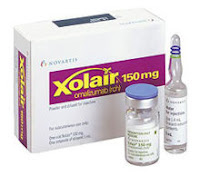 Pathogenetic concept and clinical trials support the view that anti-IgE treatment is specifically effective in allergic asthma. However, there is now growing clinical and mechanistic evidence suggesting that treatment with the anti-IgE antibody omalizumab can be effective in patients with intrinsic asthma.
Pathogenetic concept and clinical trials support the view that anti-IgE treatment is specifically effective in allergic asthma. However, there is now growing clinical and mechanistic evidence suggesting that treatment with the anti-IgE antibody omalizumab can be effective in patients with intrinsic asthma. There are currently two hypotheses that might explain the clinical effects of omalizumab in patients with intrinsic asthma:
- One hypothesis assumes that patients with intrinsic asthma have a localized allergy with elevated concentrations of allergen-specific IgE antibodies in the airways (similarly to another entity, local allergic rhinitis). In this scenario, anti-IgE treatment would reduce local allergic inflammation in the airways.
- Another hypothesis assumes that anti-IgE treatment reduces and IgE receptors on plasmacytoid dendritic cells (pDCs), and restores their antiviral activity, thus resulting in reduced disease severity and reduced exacerbation rates.
Large and well-controlled clinical trials with anti-IgE are warranted in patients with intrinsic asthma. In addition, there is a need to find new biomarkers which can identify patients with asthma who respond to anti-IgE treatment.
Severe asthma - differential diagnosis and management (click to enlarge the image).
If asthma treatment is not working, check DAT:
- Diagnosis - not asthma at all (VCD, CF, FBA), asthma plus AR, GERD
- Adherence - compliance with medication - 24% of asthma exacerbations are attributable to ICS medication nonadherence (http://goo.gl/1i8ET). Poor adherence to asthma medications (less than 80%) was seen in 75% of children (JACI, 2011).
- Technique - NEB, HFA with spacer, DPI, etc.
References:
Against all odds: anti-IgE for intrinsic asthma? Thorax doi:10.1136/thoraxjnl-2013-203738
http://thorax.bmj.com/content/early/2013/05/23/thoraxjnl-2013-203738.long
Image source: Wikipedia, public domain.